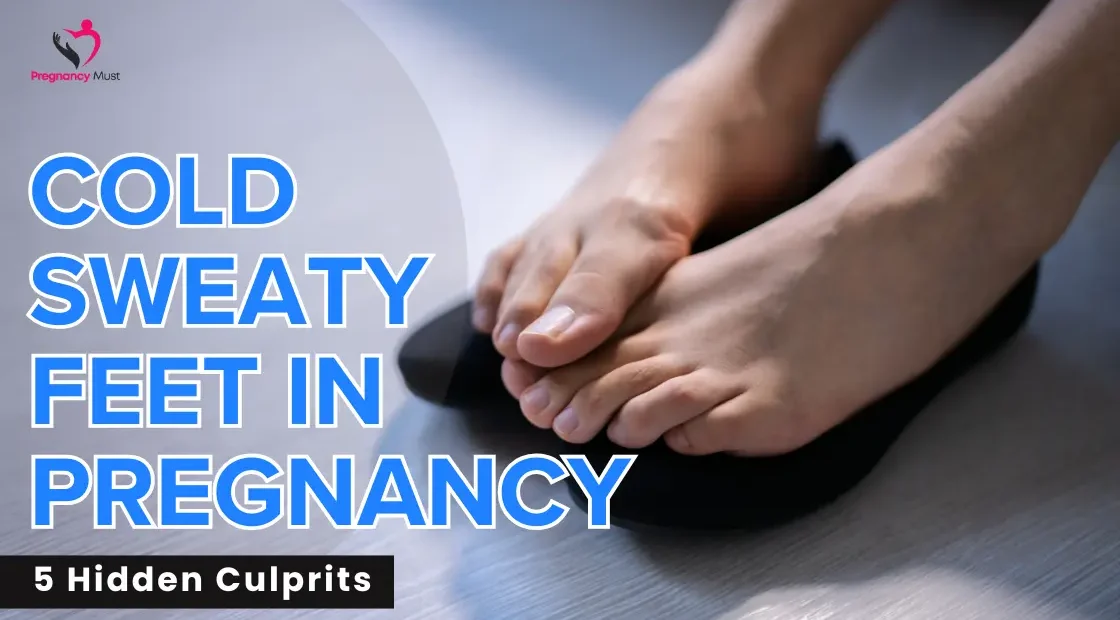Pregnancy brings many changes to the body, and one common yet often overlooked symptom is cold sweaty feet. Lots of women feel this way, but what is its change and how to deal with the problem? This comprehensive guide will help you understand why cold sweaty feet occur during pregnancy, how to manage the symptoms, and when to seek medical advice.
Table of Contents
- Understanding Cold Sweaty Feet During Pregnancy
- Why Do My Feet Sweat and Feel Cold?
- Why are Feet so Cold and sweaty? What Is the Connection?
- Causes of Cold Sweaty Feet During Pregnancy
- Managing Cold Sweaty Feet During Pregnancy
- The circulation socks for cold feet
- Consideration of Whether to Seek Medical Advice or Not
- FAQ About Cold Sweaty Feet During Pregnancy
Understanding Cold Sweaty Feet During Pregnancy
Experiencing cold sweaty feet during pregnancy is not unusual, but it can be distressing. Normally, this is a situation where your body cannot maintain a normal balance on temperature control and the feet ends up sweating even without feeling hot to the touch. This is usually as a result of hormonal changes, circulation problems or lifestyle complications so it is necessary to know what triggers the situation, in order to correct the situation successfully.
Why Do My Feet Sweat and Feel Cold?
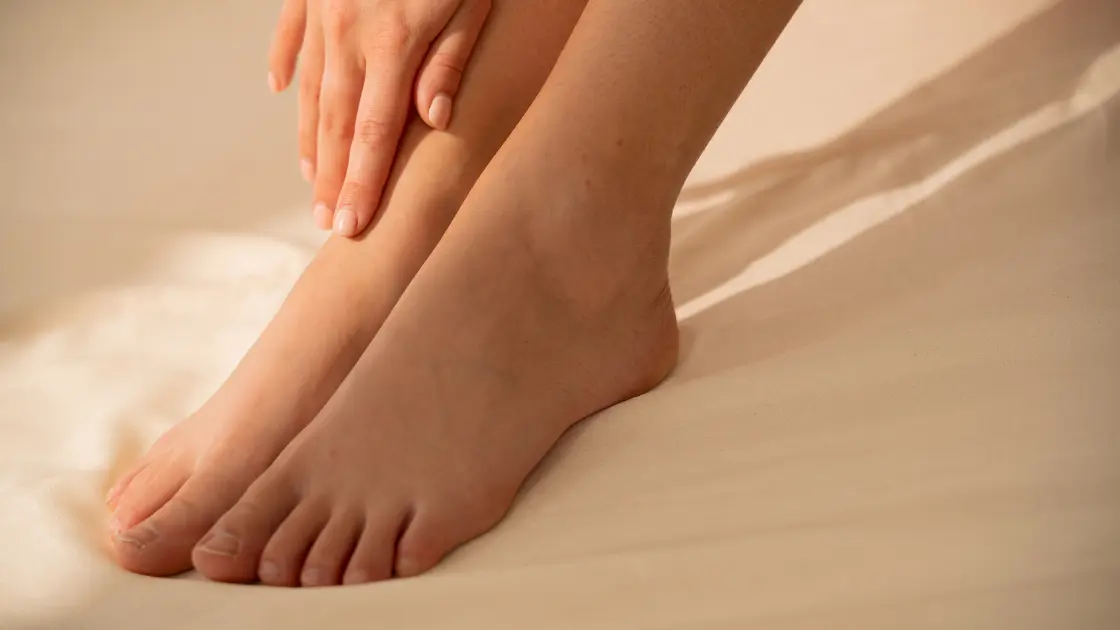
The most frequently asked question is, “Why do you have sweaty feet that feel cold?” Cold sweaty feet can be linked to hormonal fluctuations, particularly during pregnancy. Increased blood flow to your extremities during pregnancy can lead to cold sweaty feet. Yet, your body will surely go through phases of changes in temperature, which impacts circulation, which is why you end up feeling as though you are sweating even when you know your feet are cold.
Why are Feet so Cold and sweaty? What Is the Connection?
A lot of times pregnancy causes changes in blood flow. It can cause circulation difficulties in the feet when the body works harder to pump blood to the increasing baby. Consequently, you can have sweaty and cold feet. Issues with your circulation may make you feel too cold in the extremities and feeling that you may need to bathe sometimes because your body is sweating too much as an attempt to find the balance between hot and cool.
Causes of Cold Sweaty Feet During Pregnancy
Hormonal Changes
Hormonal fluctuations are a key factor in cold sweaty feet during pregnancy. Due to increasing levels of progesterone, blood vessels are dilated resulting in distortion of blood flow hence making our feet cold and sweaty and this makes one uncomfortable.
Progesterone Effects: Elevated progesterone dilates blood vessels, leading to changes in circulation, which can cause cold sweaty feet. The inequality in the blood circulation may cause the inability of your body to keep the feet warm.
Thermoregulation: Thermoregulation is where the body is in a bid to maintain temperature and this often makes the feet feel cold even when one is perspiring. This is even complicated by the pregnancy changes in hormonal levels, which makes it more difficult to remain warm in the extremities.
Increased Flow of Blood: When a person is pregnant, the body gets an increased amount of blood, therefore causing blood to rush to other parts of the body, leaving the feet and the hands. This reduces warmth in the extremities, contributing to cold sweaty feet.
Progesterone and Sweat Glands: Progesterone will also cause the sweat glands to be more active specifically in feet leading to sweat being produced at an enhanced rate contributing to the pain.
Effect on Vasodilation: Progesterone encourages vasodilation that causes blood vessels to enlarge so that body warmth is lost through the skin surface which may include the feet that can feel cold even though sweating.
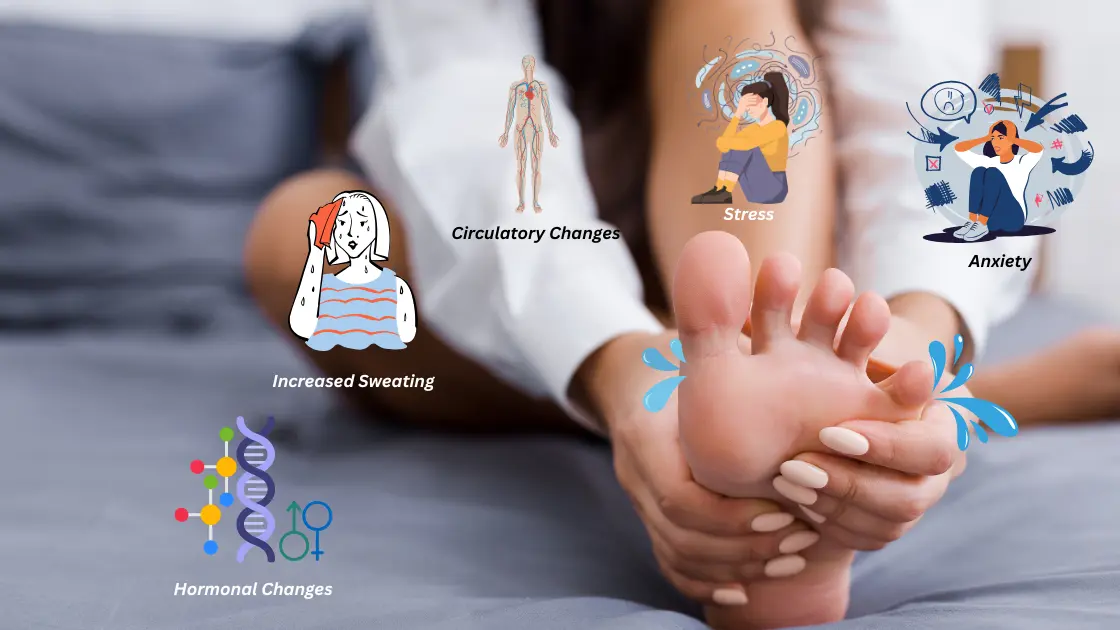
Circulatory Changes
Pregnancy also brings about some changes in the circulation because the pregnant woman because the baby requires extra blood to facilitate its growth. This increased blood flow can affect circulation, often leading to cold sweaty feet, even though your feet may sweat.
- Increased Blood Supply: This causes the increased blood supply to oxygenate you and your baby but the feet feel cold despite the sweating. The body will also compensate by ensuring that the extremities, such as the feet, are colder, as a result of decreased circulation to the feet.
- Poor Circulation: The blood is diverted to the major body organs; hence, circulation slows down to the extremities. This may make feet to feel cold and sweaty as the blood circulation to the feet is not as strong in a manner that destroys the temperature regulation. This impairs blood circulation to your feet so that they may not get warm even in the presence of normal peripheral circulation.
- Slower Blood Flow to Feet: The changes in the circulatory system during pregnancy can result in slower blood flow to the feet, which is a factor contributing to cold feet sensation in pregnancy, especially when coupled with the fact that the body is trying to balance the temperature.
- Swelling and Pressure: Pregnancy-related inflamed legs and feet also affect the blood flow by making it harder and higher pressure in the legs and lower extremities, which not only makes the feet feel cold but also causes sweating as the body tries to overcome the changes in blood circulation conditions.
Increased Sweating
Pregnancy causes hormonal shifts that increase perspiration, often resulting in cold sweaty feet. The ability of the body to balance the internal temperature changes because of the performance of sweating, a process that is less effective in people during pregnancy.
- Excessive sweating is a response of the body to maintain balance: Hormonal imbalances cause excessive sweating of the feet, particularly when the body tries to maintain temperature. This can lead to discomfort, leaving you with cold, sweaty feet as the sweat accumulates without providing warmth. The feet can have a wet and cold feel because of excessive sweating that the body cannot get rid of because it is wet.
- Ineffective Temperature Regulation: The feet do not always warm when there is excess sweat. Rather, it could result in an antagonizing feeling of being cold in spite of the sweatiness when your body is working hard to regulate heat. This mismatch between sweating and feeling warm may be rather annoying and irritating, thus making you feel warm and cool simultaneously.
- The effect of hormones on sweating: Progesterone and other hormones associated with pregnancy stimulate sweating glands and make people sweat more. It is especially evident in the feet, where one experiences cold and clammy feet, although the body sweats to cool itself.
- Reduced efficiency of sweating: The efficiency of the sweating process is also affected negatively by pregnancy changes in the manner through which the body controls its temperature. The body can initiate the sweat production process to cool the body thus, providing relief but because of the change in hormones the body may not be sufficiently warming the feet making them uncomfortable.
Stress and Anxiety in Pregnancy
Pregnancy-related stress and anxiety can worsen cold sweaty feet. When one is stressed, hormones are activated and they disrupt temperature regulation, which usually causes them to sweat a lot in their feet.
- Hormonal Response to Stress: Stress elevates the level of cortisol, which interferes with the effectiveness of body temperature regulation. The high level of cortisol also reduces the capability of the body to maintain a balance in the production of heat and sweating, and hence there is a raised level of sweating. This contributes to cold, sweaty feet, causing discomfort as the feet sweat more without warming up.
- Sweating Trigger: Excessive sweating or hyperhidrosis can be a symptom of anxiety; in this case, the feet are usually affected. When paired with the other changes brought about by pregnancy, it can leave feet feeling cold and even damp. The body’s heightened response to stress and anxiety can over activate sweat glands, making it more difficult to manage cold, sweaty feet. This over sweating combined with cold feet can make this experience very bad and frustrating and lead to worsening of the symptoms.
- Effect of Stress on Circulation: Stress may also cause poor blood circulation, such that the extremities take in less blood. This poor circulation may lead to cold feet since combining it with sweating gives rise to a greater awareness of discomfort and wetness in your feet when you are pregnant.
- Stress-Induced Discomfort: Persistent stress during pregnancy can create an ongoing cycle of discomfort, leading to a heightened state of awareness of the cold sweaty feet sensation. This is a continuing uncomfortable feeling that can give rise to more anxiety and a more difficult time getting relief from the discomfort.
Managing Cold Sweaty Feet During Pregnancy
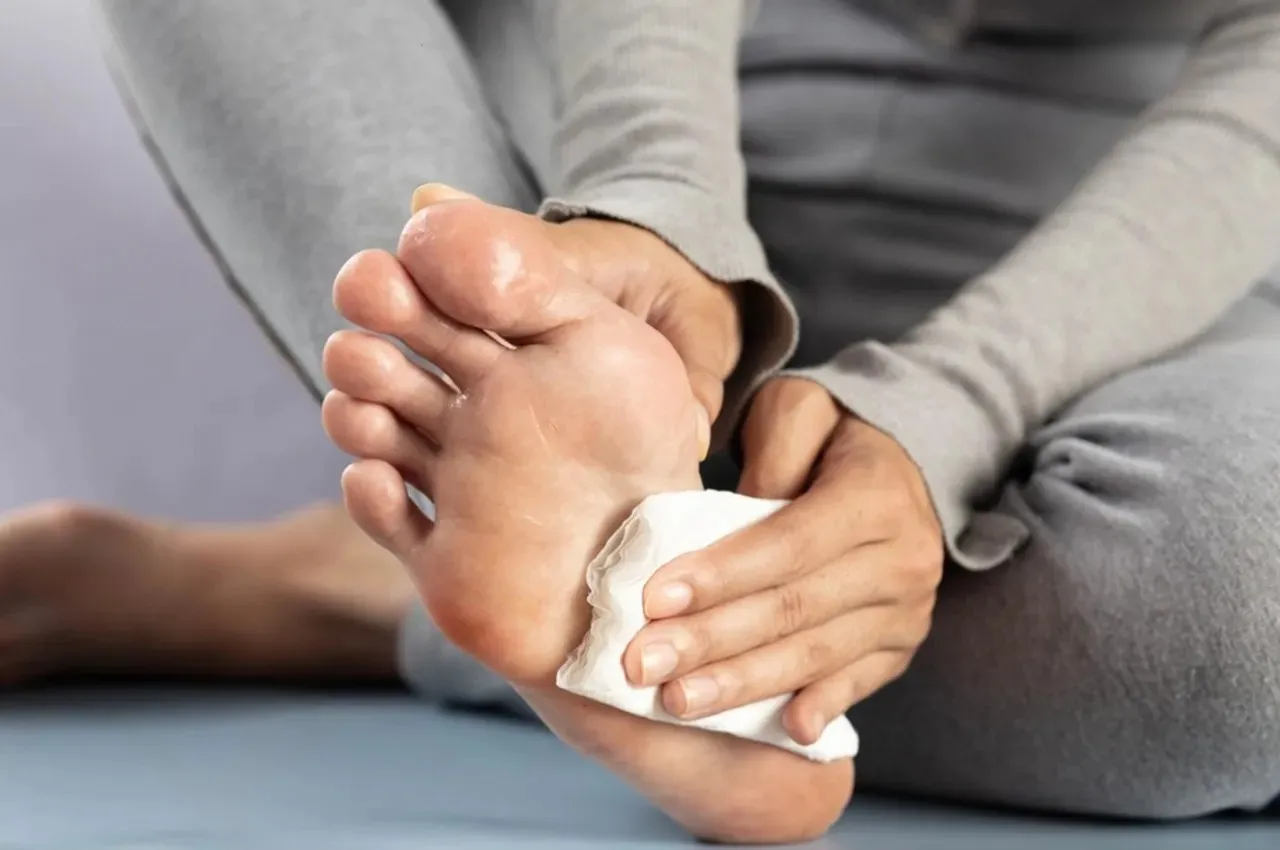
Put on Wearing Breathable Shoes
When dealing with cold sweaty feet, choosing breathable shoes is essential. They ensure air circulation which prevents too much sweating of the feet or making the feet cold. Cotton and mesh are the best fabrics at drawing sweat and keeping one cool. Also, do not wear shoes that will lock in the moisture, including rubber and plastic surfaces, as these can make you sweat which will subsequently lead to discomfort.
Dry Feet
Moisture-wicking socks are key for managing cold sweaty feet. The socks also keep the feet dry and avoid the occurrence of sweat leading to the coldness of feet. It is also possible to prevent moisture accumulation by frequent change of socks, which will help to avoid the discomfort. Select socks that are made of breathable fabrics such as wool, synthetic blends, etc; these will help the socks to absorb moisture more easily than cotton ones.
Hydrate
Drinking plenty of fluids is essential in pregnancy Drinking enough water helps regulate body temperature, which can reduce the occurrence of cold sweaty feet. Hydration also enhances blood circulation, and general well being with body maintaining equilibrium. It is recommended that one consumes at least 8 cups of water a day or more in case of exercising or in cases of a hot weather.
Dance and Physiology
Regular physical activity, like walking or stretching, improves circulation and can alleviate cold, sweaty feet. Exercise will keep circulation in the feet and it will not make them sweat excessively. It is always advisable to consult a medical professional before beginning any new routine of exercises, particularly when pregnant, so that it is both risk-free to you and your child.
Raised Up Feet
Raised feet will improve the circulation and reduce the swelling. This action warms up your feet and relieves discomfort caused by cold sweaty feet. Elevating the feet will improve blood circulation and swelling too. Elevation can be done at least 2 times per day that can last 15-20 minutes to get the complete experience.
The circulation socks for cold feet
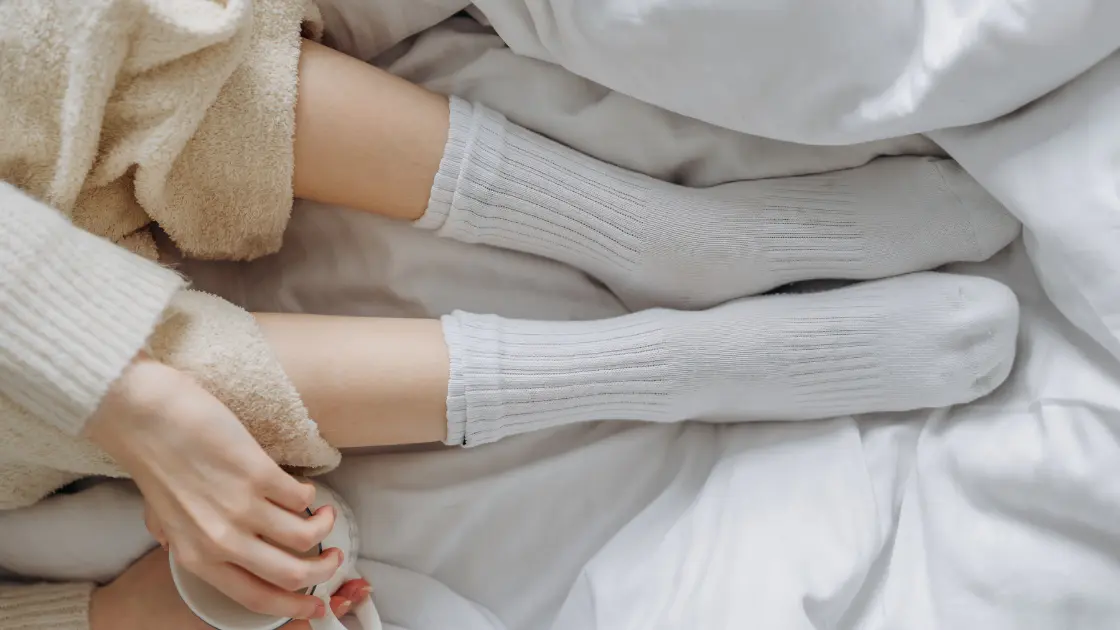
Circulation socks can help alleviate cold sweaty feet by improving blood flow, providing warmth, and reducing sweating. These socks come in handy especially during pregnancy where they provide comfort and alleviate pain.
Improved Blood Flow: The Circulation socks increase blood flow to the feet and helps to keep the feet warmer, which makes them less cold. The enhanced blood flow ensures that your feet receive adequate warmth, which can prevent the discomfort caused by cold sweaty feet. This circulation improves as well, and the accumulation of sweat is also minimised which allows your feet to feel even all day long.
Alleviation of Heavy Sweating: The increased blood flow also offers relief to excessive sweating, as the temperature of the body is controlled and the feet dry up. This makes the experience easier because the socks offer a better atmosphere to control the temperature of the feet. They also serve the purposes of deterring the clash between the feeling of coldness and sweating, and keep the feet warmer and drier in a much-needed way during pregnancy.
Support for Pregnancy-Related Circulatory Changes: During pregnancy, the body’s circulatory system undergoes changes that can lead to discomfort and cold sweaty feet. Given that, circulation socks are made to help with these transformations and enhance freshness and reduce the impact of cold feet or swollen feet, which makes them a paramount option among expectant mothers.
Protective and Comfortable: These socks will safeguard your feet and legs by offering mild pressure, and they are very comfortable even when you wear them all day long. The added comfort can help relieve pressure on your feet, preventing swelling and making it easier to manage cold sweaty feet.
Consideration of Whether to Seek Medical Advice or Not

If you experience persistent cold sweaty feet that don’t improve with home remedies or are accompanied by other symptoms like severe swelling, pain, or changes in skin color, consult your healthcare provider. This might be symptoms of other problems, which ought to be addressed by a medical practitioner.
FAQ About Cold Sweaty Feet During Pregnancy
Q1: Can cold sweaty feet during pregnancy be harmful to my baby?
A: No, cold sweaty feet are typically not harmful to your baby. Nevertheless, in case you have certain additional symptoms then it is always better to address your healthcare provider.
What happens to your feet when they are cold and each foot feels wet during early pregnancy?
A: Cold sweaty feet might result from hormonal changes, circulation problems, and excessive perspiration that are common in the early stages of pregnancy.
Q3: What can I do to ensure my feet do not sweat and are cold when I am pregnant?
A: Cold sweaty feet can be avoided by elevating your feet, wearing breathable socks, and drinking enough of water.
Q4: Are there any over-the-counter treatments for cold sweaty feet during pregnancy?
Seek the advice of your physician first before using any form of treatments. Other women are relieved to wear circulation socks or water-wicking socks.
In conclusion, this guide provides a deeper understanding of the causes and effective treatments for cold sweaty feet during pregnancy. With the correct measures, including controlling your blood flow, drinking lots of water, and buying yourself the right shoes, you can alleviate this common pregnancy ailment and feel much better. Nevertheless, it is important to consult your health care professional when symptoms do not improve or become worse.
Explore more on Pregnancy Must –
